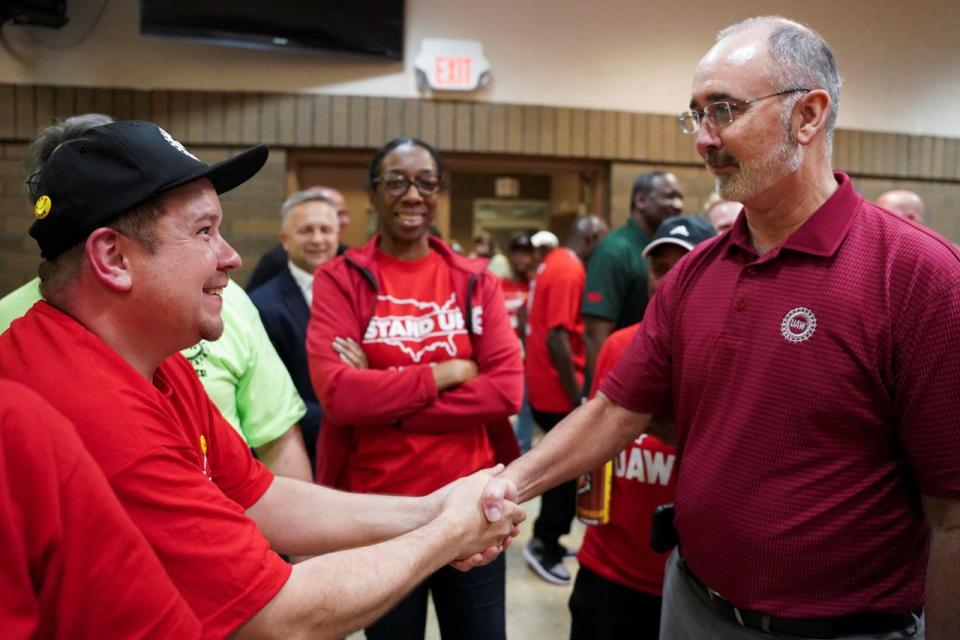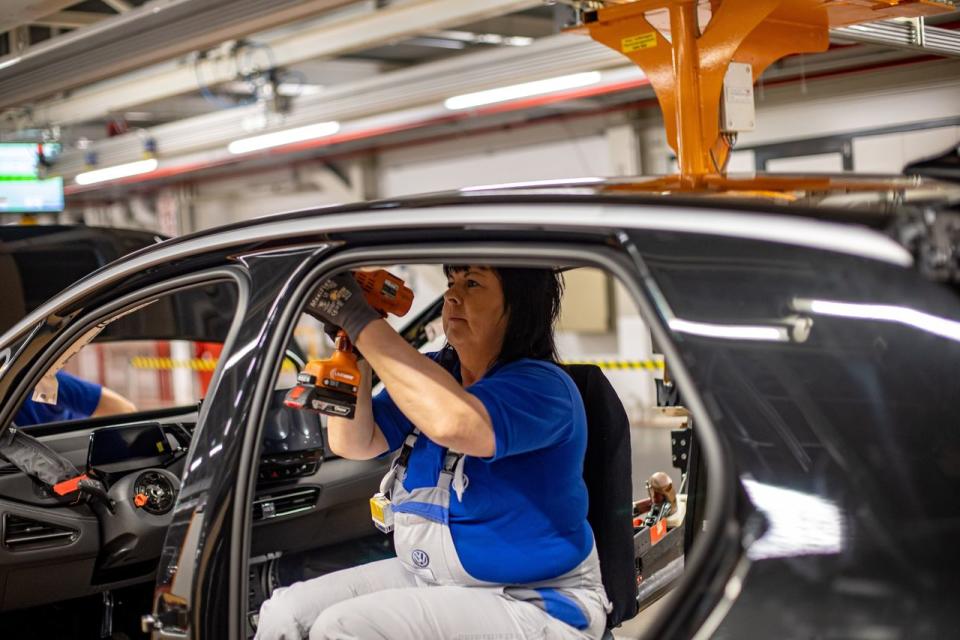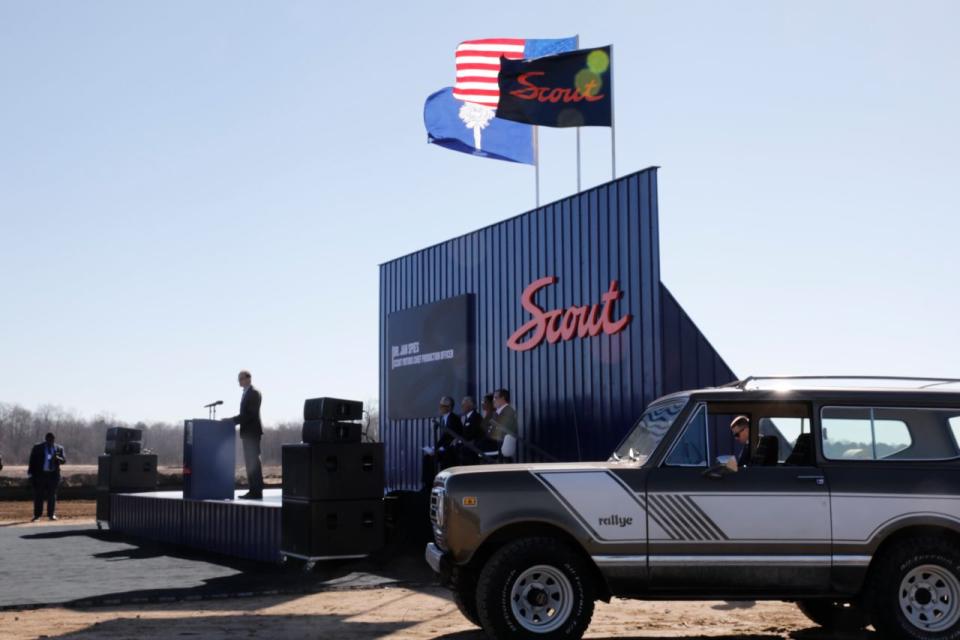VW Works Closely With Unions in Germany, but UAW May Be Less Cuddly

BERLIN—Volkswagen knows all about running a business with union representatives at the table. But that experience may not be a perfect guide for how to work with the United Auto Workers at its Chattanooga plant.
Most Read from The Wall Street Journal
Meet the Tesla Diehards Sticking With the Stock Despite Its Disastrous Year
Nike Reverses Course as Innovation Stalls and Rivals Gain Ground
Sam Altman Invests in Energy Startup Focused on AI Data Centers
After workers at the plant last week voted in favor of being represented by the UAW, VW thanked employees for participating in the ballot. Now, under federal labor law, the company must enter negotiations with the UAW on an agreement covering pay, work hours, safety protocols and other items.
VW may not have much choice but to make the best of it, analysts say, given the economic benefits of making cars near customers, especially because of tariffs and the possibility of more of them.
“Union membership is the price German manufacturers will have to pay for building cars where they sell,” said Fabian Brandt, a senior consultant at management consulting company Oliver Wyman.
“I don’t believe that any of the German players will reduce investment in this region,” Brandt said, adding that VW might seek to offset potential wage increases with higher productivity. “The geopolitical environment is too uncertain and the risk of additional trade barriers is too high…to risk access to the lucrative U.S. market.”
VW is in the midst of a multiyear investment push to increase its share of U.S. new car sales, which analysts estimate at about 4% last year, compared with 25% in Europe and 14% in China. VW began its U.S. reboot with a series of SUVs, including the Chattanooga-built Atlas. Alongside the Atlas, VW builds its ID.4 electric crossover SUV in the city.
The company is planning to launch an EV range in the U.S. over the next few years. VW executives have said they believe the company can boost its U.S. market share faster with EVs because its rivals in the U.S. have been slower to develop electric cars.
VW’s American management could face challenges replicating in the U.S. the generally placid relationship it has developed with unions in Europe, given the adversarial posture the UAW has lately held toward U.S. manufacturers.
At a celebration with VW workers after the vote, UAW President Shawn Fain called the decision a historic moment and the result of a decade of organizing and collaboration with VW’s labor leaders, and signaled the union’s pressure campaign for workers would be fierce.
“The real fight begins now,” Fain said, as union members in UAW T-shirts waved banners and cheered. “The real fight is getting your fair share. The real fight is the fight to get more time with your families. The real fight is the fight for our union contract.”
While UAW representation could start to narrow the labor-cost gap between VW and the unionized plants in Detroit and elsewhere, it also will strengthen the union’s hand broadly, said Bob King, who was the UAW’s president in the early 2010s. Adding more car companies should bolster the union’s bargaining clout and lead to higher wages across the industry, he said.
“This should both raise and level the playing field for everyone,” he said.
The potential impact from the UAW’s expansion could be a focus this week when Tesla, General Motors and Ford Motor are scheduled to report first-quarter earnings.
In Germany, large companies are required by law to have labor representatives on their supervisory boards. Under the country’s two-tier governance structure, these nonexecutive directors monitor the executive board that runs the company day to day. The IG Metall union, which has half the votes on VW’s supervisory board, played a role on several occasions in convincing the company’s directors to oust CEOs who had fallen out of favor.

But the German system also encourages management and labor to find common ground and avoid disruptive strikes that can damage the broader economy—and profits. Given labor’s board representation, most strategic decisions require a degree of trade-union buy-in. This setup encourages management and organized labor to act as sparring partners. German unions have been historically open to compromise, for instance, on limiting pay in exchange for job guarantees in tough times.
At the same time, decisions that affect large numbers of workers, including layoffs or the closure of uncompetitive plants, must be negotiated with unions and can end up being delayed and watered down. Critics say this adds costs and makes German industry less flexible and unable to shed sluggish businesses quickly and move on to more promising enterprises.
A few years ago, VW management decided it needed to slash around 30,000 jobs worldwide by 2025, most of them in its German factories, to boost profit and retool the workforce for the coming investment push into electric vehicles.
The move was approved by the supervisory board, with labor support. There were no strikes, no walkouts and little protest. Instead, management, unions and politicians agreed to phase out the jobs by not replacing workers set to retire in large numbers in the coming years.
Older workers were offered early retirement buyouts. Younger workers were offered the option of being retrained to work in fields related to electric vehicles. Thousands of the job cuts were offset by new hires with skills needed for EVs and batteries.
VW has less experience with U.S. organized labor, but Chattanooga isn’t the first place where it has had to work with the UAW.
In 1978, months after VW opened its first U.S. plant in Pennsylvania, UAW workers at the plant staged a wildcat strike, demanding pay increases to put them on the same level as Detroit auto workers. The clash, which resulted in better pay for VW’s U.S. workers, wasn’t sanctioned by the UAW, which had made more moderate demands that were rejected by the rank and file.
For much of the next decade, VW faced continued labor unrest at its Pennsylvania plant and struggled with sluggish sales of the Rabbit, the U.S. version of VW’s Golf model, and the Jetta. VW shut down the plant in 1988. In 2008, VW announced that it would build the Chattanooga plant in a bid to revive its U.S. business. The plant began producing Passat sedans in 2011 before shifting to the Atlas.

A new VW subsidiary, Scout Motors, is building a factory in South Carolina that is slated to manufacture all-electric Scout off-road vehicles. According to people familiar with the company’s plans, the Scout vehicle is based on EV technology created by Audi, the upmarket VW brand. Audi plans to build an electric vehicle using that same technology at the plant, these people said.
As the Scout plant is in the early phase of construction, it is unclear whether its future workforce will also be organized by the UAW.
VW also builds cars in Mexico, leaving it the option to shift some of its North American production to its Mexican factories. Analysts say that whether this happens will in part depend on VW and the UAW’s ability to strike a German-style relationship where cooperation, job security and stability are prized above confrontation.
Write to William Boston at william.boston@wsj.com
